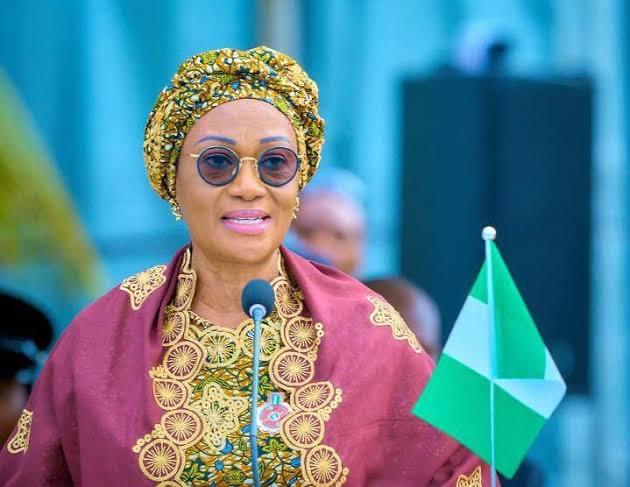
Oluremi Tinubu Donates N1 Billion to Battle Cervical Cancer in Nigeria

In a bold and compassionate move that has stirred nationwide commendation, Nigeria's First Lady, Senator Oluremi Tinubu, has donated a remarkable sum of One Billion Naira to the National Cancer Fund to bolster the country’s ongoing fight against the devastating scourge of cervical cancer. This donation, which represents one of the largest individual contributions in recent times toward women's health, has sent a strong message of hope, commitment, and national urgency in addressing a disease that silently claims the lives of thousands of Nigerian women each year.
The First Lady, a seasoned lawmaker, philanthropist, and advocate for women's well-being, made the announcement during a high-profile event centered around women's health and cancer awareness. The event, attended by key government officials, health professionals, civil society leaders, and representatives of international health organizations, underscored the rising need for aggressive and sustained action in the fight against cervical cancer in Nigeria.
Cervical cancer, though preventable and curable when detected early, remains one of the leading causes of cancer-related deaths among women in Nigeria. According to the World Health Organization (WHO), Nigeria records over 12,000 new cases annually, with nearly 8,000 deaths. The primary drivers of this grim statistic include low awareness, limited access to screening and vaccination, and the high cost of treatment. It is against this backdrop that Senator Tinubu’s timely donation has been hailed as a critical intervention that could change the narrative for countless Nigerian women.
While addressing attendees, the First Lady emphasized that her action was inspired by the plight of women who suffer in silence due to the lack of resources, information, and support. She noted that every woman, regardless of status or location, deserves access to life-saving screening, vaccination, and treatment services. “This contribution is not just financial—it is a commitment to the lives of Nigerian women and girls. It is a call to action for all stakeholders to rise and collectively confront a disease that robs families of mothers, sisters, daughters, and wives,” she stated.
The N1 billion donation will be channeled into the National Cancer Fund, a government-backed initiative designed to provide financial support for cancer diagnosis, treatment, and prevention strategies across the country. A significant portion of the fund will be earmarked for nationwide cervical cancer screening campaigns, free HPV vaccinations for young girls, and the establishment of more screening centers, especially in underserved rural communities.
Health experts have lauded the donation as a watershed moment in Nigeria’s public health history. Dr. Aisha Bello, a gynecologic oncologist based in Abuja, described the initiative as “a game-changer,” noting that the financial barrier is one of the main reasons many women do not seek early treatment. “The First Lady’s donation will go a long way in reducing this barrier. More women will be able to access care without the fear of unbearable medical bills,” she remarked.
Beyond the medical impact, the gesture has also sparked renewed conversations about the role of influential public figures in driving social change. Senator Tinubu’s action has been praised for setting a high standard for philanthropy, especially among Nigeria’s political and economic elites. Many have called on other public office holders, corporate bodies, and well-meaning individuals to emulate her example and contribute to the national effort to eradicate cervical cancer.
The initiative also aligns with the global push led by the WHO to eliminate cervical cancer as a public health problem by the end of the century. Nigeria, as one of the high-burden countries, has been urged to ramp up its efforts through mass vaccination against the Human Papillomavirus (HPV), comprehensive screening programs, and improved access to treatment facilities. The First Lady’s donation is expected to accelerate progress towards meeting these goals.
Social media platforms and public forums have been abuzz with reactions from Nigerians who have expressed gratitude and admiration for Senator Tinubu’s gesture. Hashtags such as #HopeForWomen, #CervicalCancerAwareness, and #OluremiTinubu have been trending, with many citizens sharing personal stories, health tips, and calls for increased awareness. The development has also caught the attention of international media and health agencies, some of which have pledged to support the initiative through technical and logistical assistance.
In recent months, the Office of the First Lady has shown an increasing interest in championing women-centric causes, particularly in health and education. This donation adds to a growing portfolio of programs under her Renewed Hope Initiative, aimed at uplifting vulnerable groups and addressing social issues that disproportionately affect women and children in Nigeria.
As the country celebrates this historic donation, health officials and policymakers are now tasked with ensuring that the funds are effectively managed and transparently utilized. Advocacy groups have stressed the importance of accountability, noting that the success of the initiative depends on clear strategies, measurable goals, and continuous public engagement.
Senator Tinubu, however, remains optimistic. In her speech, she reiterated her belief in the resilience and potential of Nigerian women. “When women are healthy, families thrive, communities flourish, and the nation prospers. We must protect them. We must empower them. And together, we must defeat cervical cancer,” she declared to a standing ovation.
With this monumental step, Nigeria may be on the brink of a transformative era in women's healthcare. The fight against cervical cancer has received a powerful boost—not just in terms of funding, but in the visibility, urgency, and compassion that the First Lady’s intervention has inspired. As awareness continues to grow and support intensifies, there is renewed hope that the tide is turning in favor of a healthier, safer future for Nigerian women.


